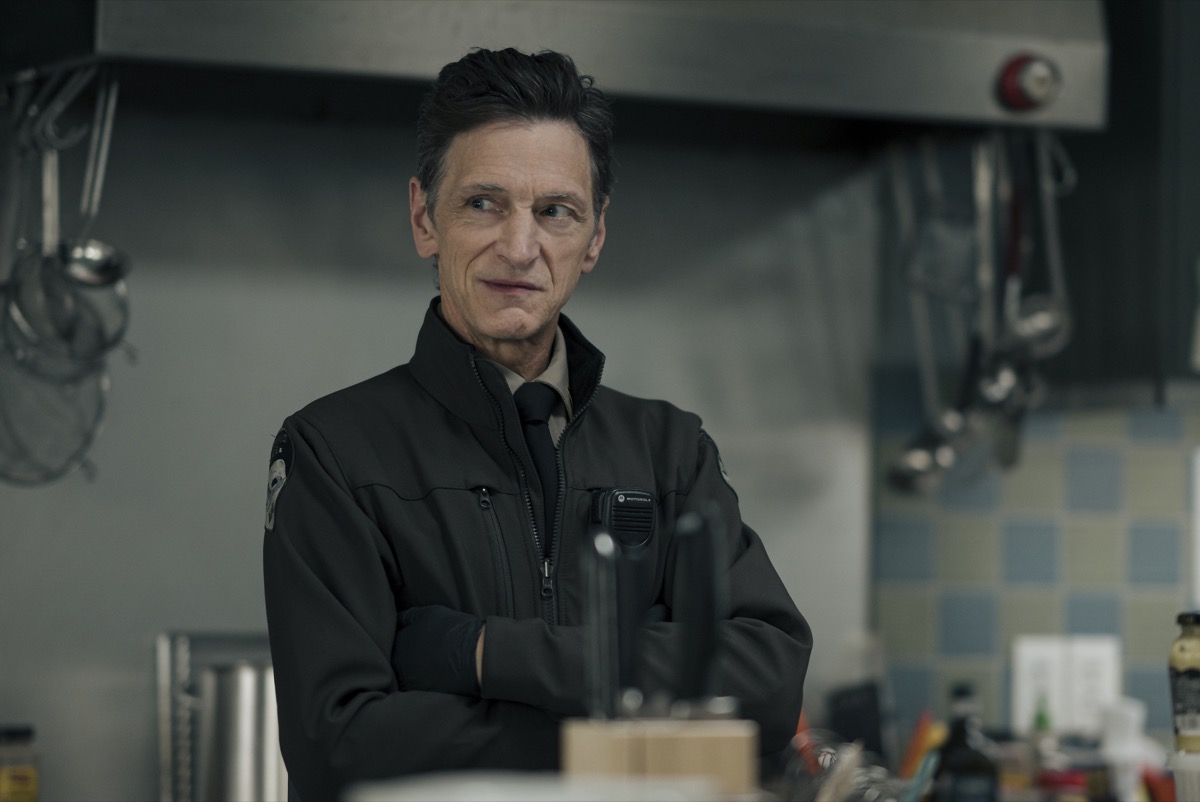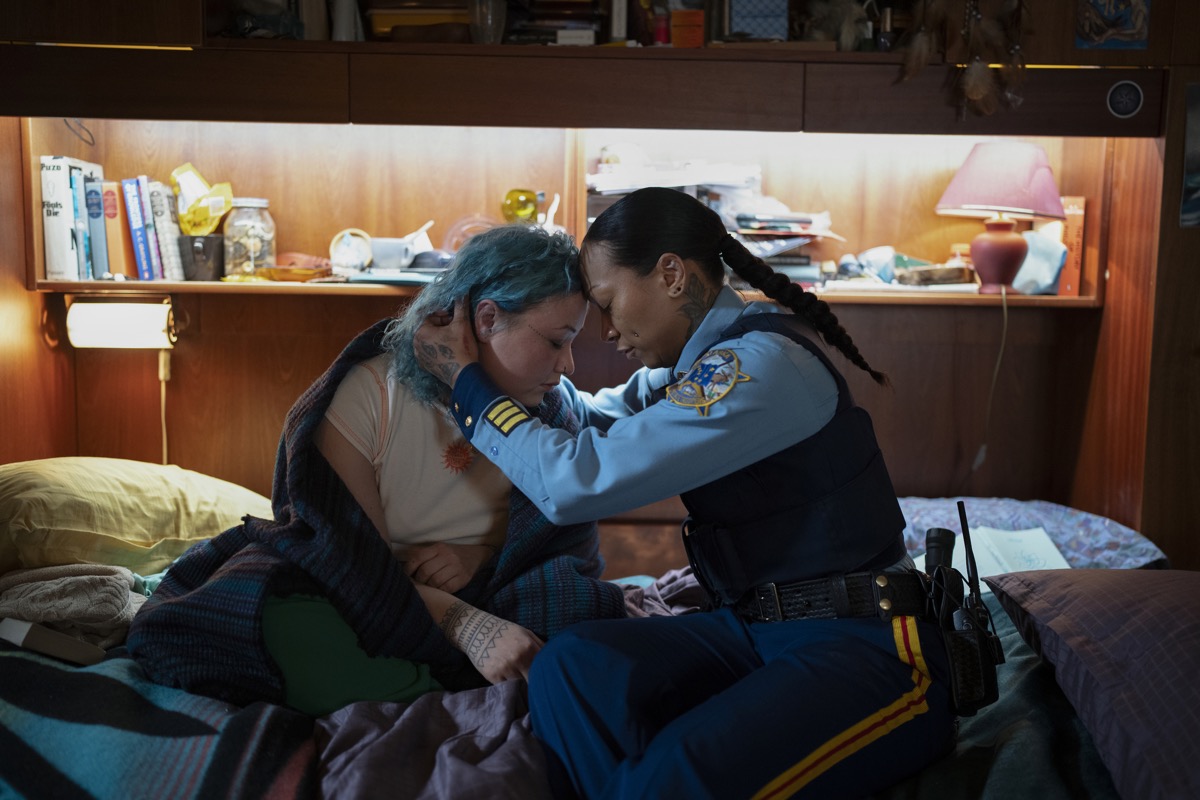‘True Detective’ Leaves the World Behind

It’s been 10 years since True Detective first captured our imagination. With a compelling new mystery set in the chilling Alaskan darkness and a contentious rapport between cops played by Jodie Foster and the formidable Kali Reis, season 4’s Night Country recaptured it in an instant.
The premiere episode of True Detective: Night Country—the first in the series to receive a subtitle—begins not with a murder or a disappearance, nor with the cops we’ll be following throughout the investigation, but with a warning. 150 miles north of the Arctic Circle in Alaska, in the last gasp of light before 30 days of darkness overtakes the land, an Indigenous man sets the sight of his rifle on a herd of elk. Seconds before the sun reverses its dawn course to retreat for a month, in a scene that evokes the recent Leave the World Behind, the elk get spooked and begin vocalizing as they run straight for a nearby cliff and leap off. Did they choose to end their lives to avoid the hopelessness and despair of a season they weren’t likely to survive? Or did they sense something supernatural lurking in the darkness; something worse than the darkness itself?
This breathtaking moment sets the tone for a stark new season of True Detective. Created by Issa López (who conceived Night Country as an original story before HBO called her up), the Mexican filmmaker behind Tigers Are Not Afraid, season 4 abandons the series’ sunnier settings for the fictional town of Ennis, Alaska during the area’s annual period of darkness. When eight men from the Tsalal research station suddenly disappear, leaving only a woman’s severed tongue behind, police chief Liz Danvers (Jodie Foster) is called in to investigate.
The steely Danvers isn’t the only officer on the case: State trooper Evangeline Navarro (boxer Kali Reis, proving herself an equally skilled actor) can’t shake the murder of Annie K., a local Iñupiaq woman who was stabbed to death and whose tongue was removed. Annie K.’s unsolved murder torments Navarro, whose tenacity and emotional investment in the case earned her a dishonorable transfer to the trooper division. The interplay between Navarro and Danvers—a local woman of color and an older white woman transferred in from the outside—is the focal point of Night Country and a conduit for the existential turmoil in Ennis, a remote mining town that only seems to know hard living.

At the Tsalal Station, where researchers plumb centuries of ice for signs of the origin of life (never a good idea), Danvers quickly establishes why she’s the chief around these parts: While her colleague Hank Prior (John Hawkes, WHERE HAVE YOU BEEN) lazily dismisses potential evidence, Danvers uses her Holmesian critical thinking skills to deduce that the researchers have been missing for a couple of days, at least. To wit: the mayonnaise on a ham sandwich has turned gelatinous from sitting out. The pair are joined by Prior’s son, Deputy Peter (Finn Bennett), who is eager to learn the ropes from Danvers—and keenly aware of his father’s shortcomings, it seems. This notion is reinforced when we see Peter at home with his wife and their young son, who’s become preoccupied with native myths imparted by his maternal grandmother. Unlike Danvers, who mocks Navarro’s beliefs, and Prior Sr., who dismisses anything that doesn’t serve his goal of a simple life unencumbered by trauma and filled with blow-jobs from single moms, Peter is more accepting of the local culture as a fact of life—not some relic to be covered up and hidden away.
Here’s what we know about what happened at the Tsalal Station: The men were going about their business when one of them stopped cold in his tracks—not unlike the elk—and briefly convulsed before whispering, “She’s awake.” This part we see. What we don’t see pertains to what Danvers finds, including how a severed tongue that possibly belongs to a woman murdered years ago wound up under a table, and who wrote “We’re all dead” on a whiteboard. The men’s phones were all left behind, suggesting an abrupt departure; meanwhile, the TV is stuck on the parade scene in Ferris Bueller’s Day Off. (You may have also spotted a copy of John Carpenter’s The Thing on the shelf. Were these guys tempting fate or what?)
Despite her initial dismissal, Danvers takes Navarro’s suggestion to re-examine the Annie K. case seriously, and has Deputy Peter pull the file from a storage box at Hank’s house. (Where Hank is prepping for the arrival of his 90 Day Fiancé by painting the walls a hideous shade of blue.) Annie was a young midwife whose body was found in a shipping container on the edge of town. Navarro was the first to arrive on the scene and observe the 32 star-shaped stab wounds covering Annie’s body. López captures the crime scene thoughtfully, choosing close-ups of Annie’s lifeless fingers and the holes in her body, and focusing on Navarro’s reaction to guide the viewer’s understanding. There are no lurid shots of naked, abused women discarded in mangled heaps, like trash. It’s clear that López understands the way we seem to senselessly zero in on certain details in moments of distress: a folded limb streaked in mud, the sound of a shoe crunching ice on pavement, the textures of memory.
We see a similar flash of memory overtake Danvers briefly when her car skids over an ice patch and she gets out to see if another driver, who crashed into a phone pole, is okay. When the accident happens, Danvers is in the process of driving her teen stepdaughter Leah (Isabella LaBlanc) home after learning from another mom that Leah was caught filming herself having sex with the woman’s 16-year-old daughter. We’re not sure how old Leah is just yet, only that she’s old enough to warrant correcting Danvers for erroneously describing Leah’s sex partner as being 15 years of age.
It’s obvious that some terrible tragedy befell Leah’s dad, not unlike the many tragedies that seem to have shaped every corner of Ennis; a place where hardship is so commonplace as to be unremarkable, and where Danvers pointedly lays the blame of Annie K.’s death on the town itself. What is remarkable is the disappearance of eight men. Navarro is quick to point out the hypocrisies and inequities; if Annie K. had been white, the police response would’ve been swift and relentless. Danvers is so laser-focused on the Tsalal men that she willfully fails to recognize the local women in need at every turn: she roughs up a single mother who drunkenly crashes into a telephone pole and calls her a bitch before sending her off to jail for the night, though it’s clear that the woman is struggling and abusing alcohol to cope. Her stepdaughter Leah would probably benefit from more questions and fewer harsh reprimands.

Meanwhile, Navarro tries to keep her life outside of work simple. She visits bar owner Qavvik, with whom she seems to have a friends-with-very-good-benefits situation, and checks in with her sister Julia, who is desperate to manage her mental illness without hospitalization. Though she references the spiritual realm, Navarro insists that her time in the military and the horrors she witnessed in the Middle East made her an atheist. When Annie K.’s brother muses that it must be nice to still believe in God and know that we’re not alone, Navarro responds, “No, we’re alone. God, too.” As she does, Navarro briefly flashes back to her time overseas, and López delivers another beautiful shot of something so harrowing and visceral; a memory that forcibly resurfaces unbidden, summoned by a word or a phrase.
Danvers’ laser focus leads to an important discovery (as she arranges crime scene photos in a spiral, one of a few callbacks to True Detective‘s past): one of the disappeared researchers was wearing a parka that looks identical to one that belonged to Annie K. And then there’s Rose Aguineau (Fiona Shaw), the older woman we occasionally see living alone and haunted by visions of a dead, barefoot man who visits and beckons her to follow. When she does, Rose finds the missing researchers sticking out of the ice, their faces frozen in terror at whatever they found.
In case you missed it, the episode opens with a quote attributed to Hildred Castaigne: “For we do not know what beasts the night dreams when its hours grow too long for even God to be awake.” Castaigne is the protagonist in one of the stories included in The King in Yellow, which viewers of season 1 may recall as one of series creator Nic Pizzolatto’s influences. That evocative quote doesn’t appear in the book; López wrote it herself, and it certainly sets the table for the long night ahead.
(featured image: HBO)
Have a tip we should know? [email protected]
